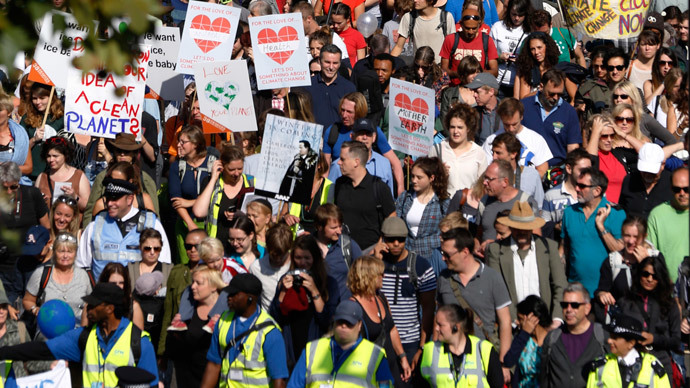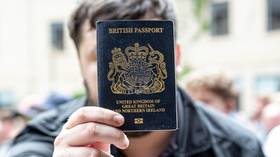Police back down on ‘pay-to-protest’ demand, but right to assembly still at risk – activists

UK authorities who insisted activists spend thousands of pounds on a private security firm to steward a peaceful climate change march in London have backed down following intense pressure. Campaigners insist they will not “pay to protest.”
Last month, Britain’s Campaign Against Climate Change (CACC) was instructed to hire a private security company to monitor its Time to Act demonstration scheduled for early March.
The request came as Scotland Yard refused to oversee the temporary closure of streets along the group’s agreed route through central London.
Met backs down a little on pay-to-protest issue, but it's still there, rumbling in the background. Authoritarianism… http://t.co/vORnZaw0Md
— toby (@tobyornot_) February 26, 2015
The Met’s government-backed demand provoked outrage, as campaigners, politicians and trade unionists warned the move signaled the privatization of citizens’ right to protest. Others feared the demonstration would simply not go ahead.
However, intense lobbying by human rights group Liberty, the CACC and campaigners nationwide has forced Scotland Yard to make a U-turn and back down.
The body confirmed Friday it will take measures to facilitate CACC's protest on March 7.
CACC said it is relieved by the news, and hugely grateful for the support it has received in recent weeks. It said, however, that Scotland Yard’s policy change caused it undue stress.
A spokeswoman for the campaign said: “Now we can focus on making our protest a really powerful message to those in power about the urgency of the climate crisis, an event bringing together families, faith groups, trade unions and all parts of society.”
She added that CACC also hopes the future fate of Britons’ right to protest remains intact.
Liberty’s legal director, James Welch, who supported CACC in challenging the Met’s demand, said UK authorities should never have forced CACC to jump through such a series of futile hoops.
“When the public wish to exercise their fundamental right to protest, police, councils and traffic authorities should be saying ‘let’s make it happen’ – not asking ‘how can we do as little as possible?’” he said.
http://t.co/AIwRM2eVBF Pay to protest? Met for now backs down over costs. @MikePannett#CutsHaveConsequences The future of policing in flux
— Paul Alker (@Sharky57) February 27, 2015
Earlier this month, campaigners launched an Avaaz petition calling upon the Metropolitan Police Service to preserve the right to protest.
The activists warned they would not allow austerity policies to force citizens to “pay to protest.”
The petition demanded that police stop the privatization of protesting by ensuring public resources were made available to monitor and manage road closures and public safety during demonstrations.
It has attracted 61,970 signatures to date.
Campaigners say the proposal breaches international human rights standards, in particular article 11 of the Human Rights Act, which stipulates that all people have the right to peaceful assembly.
Yeah, let's pay to demonstrate. What a lovely democracy... http://t.co/OOoIDHqxInhttp://t.co/GC15KcODCdpic.twitter.com/jqT2A6Kv0k
— Emmanuel Sanséau (@E_Sanseau) February 22, 2015
Despite CACC’s temporary victory, the future of free British protest remains uncertain.
In a formal statement, Scotland Yard said protesters’ right to police assistance at future protests is still in doubt.
The Met said budgetary constraints had prompted its decision to cease its facilitation of protests.
It stressed its pledge to support CACC in March does not signal a policy change because demonstrations now fall beyond its “policing responsibility.”












